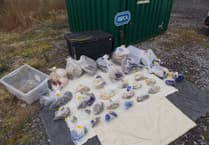Alexandra Bánfi met the volunteers who give up their time and effort to keep people safe along the coast. And they’re always on the lookout for more recruits to join their ranks
It’s a sunny evening on Aberdyfi beach, where the local coastguard team have come together for their monthly training session.
The team of six meet to train the extensive skills they’ve honed by being part of the coastguard, be it search and rescue, mud rescue, ordinance identification and protection, map reading, the list is endless. The volunteer team fill in wherever needed, assisting emergency services across mid Wales and providing a 24-hour search and rescue service.
Ewan Black, who joined the team in 2013, said: “During our monthly training sessions, we train the groups of skills we use. So we’re a specialised mud rescue team, so there is a lot of focus on that. But there are other core skills too.”
Ewan’s colleague Stuart Williams added: “Map reading is really important. Finding people when the call comes through from Holyhead can be difficult, the information they provide can be scant.”
Deputy station officer Nicola Salt said What3words, a free app that can identify any location within a resolution of about three metres, has proved an invaluable resource for them: “For the sake of people downloading a free app, it can save their lives.”
On this particular evening, I joined the volunteer team of six on the beach for their training.
While I geared up in a life jacket and a helmet, taking to the shore to save our ‘casualty’ coastguard member Steve May, the team took the time to give me a glimpse into what it’s like to be part of the coastguard.
Nicola told me “no two jobs are the same”.
Stuart, who joined the coastguard a year ago during lockdown, continued: “The interesting thing is, you have no idea what’s going to happen when you go out. There is no predictability in the role. When that pager goes off you don’t know what you’re going to be faced with.
“It’s also something nice we can do to give back to the community.”
Stuart experienced a “baptism by fire” after his first call out, alongside Nicola and Steve, was to a fatality in Tywyn.
On 9 May 2021, the pair rescued a man, in his 30s, after he got into difficulty whilst kayaking off the coast of Tywyn.
The coastguard took it in turns doing CPR and gave critical care for the casualty, supported by RNLI members who provided additional first aid and put sheets up to ensure privacy.
While the man was alive when he was pulled from the water and passed on to paramedics, he tragically died being transported to hospital.
“It’s your mind set when you volunteer for these sorts of things, it’s like running towards a fire rather than away. You have an attitude that you have to help. The training kicks in and you don’t think about it, you just get on with it.
“It’s quite stressful looking back at it. And we have a trim system in the coastguard where you get looked after by senior people after nasty things like this. We have a wellbeing network which is great, so it didn’t play on my mind too much. But it was a traumatic experience, especially for the first time.
“The family of the man who died came back last week, on the anniversary, and presented a cheque for £2,300 to the RNLI.”
In 2012, Nicola said the team also took part in the search, which went on for two to three weeks, for missing five-year-old April Jones.
But the coastguard has many other responsibilities, aside from search and rescue. They also identify and look after ordinance washed up on mid Wales beaches.
On Easter Saturday, 23 April 2022, the coastguard team were tasked to “babysit” a bomb on Aberdyfi beach.
“With ordinance, we have the responsibility to make sure it doesn’t get any worse,” Stuart explained.
“Our role is to make sure we provide exclusion zones. We need to identify it first, we take pictures and send them to head office in Holyhead and they have experts who can identify what we’re looking at. There’s so much we can get called to, for example disposed flares.
“Our role is to identify it, and identify the risk there is.
“If it’s a flare, we can remove it ourselves, we have the facilities in the truck. But when it’s an explosive, we close off the area, baby sit it, and wait for the army of the navy to turn up.
“The one on Aberdyfi, we had to make sure it was sectioned off until the tide came up and covered it. And then we came back once it went out again. We use What3words to identify exactly where it is, then we came back to make sure it hadn’t moved.
“But we’re only involved if it’s below the high water mark. If it’s above it’s the police’s responsibility.”
Stuart said an issue arises as beach-goers sometimes take the bombs home with them, unaware of what they are: “We have lots of manuals about where it’s a projectile, or a bomb, or a torpedo. There are checks we go through to identify the risk that goes with it.
“If the bomb is wet it’s safe, but if it’s dry it’s a hazard. So if people pick it up and take it home, it could be really dangerous. People do like to collect them. It didn’t look like a bomb, it was just a tube. So it does take a bit of training to identify it.”
The coastguard is also the ones to call if you find a dead porpoise, or a dolphin, whale, or sturgeon, washed up on the beach.
Under the Royal Prerogative for Fishes Royal in England, Wales and Northern Ireland, such animals are considered Royal Fish and belong to the Queen, Ewan explained.
If found on a beach, the coastguard are tasked with taking measurements and so on, to allow for the Natural History Museum to investigate why they died.
Aside from their work on the Cardigan Bay coastline, the coastguard team also attend events up and down the country.
Recently, Nicola travelled to the COP26 summit in Glasgow, from 31 October to 12 November 2021, to join coastguard teams from across the UK in ensuring the safety of those attending the summit, which took place on the waterside of the River Clyde at the SEC Centre in Glasgow.
Nicola said the teams would work in shifts, patrolling the bankside, and said it was a “nice chance to work with other teams from across the UK”.
But as well as all this work, Stuart said a lot of what the coastguard does is “proactive, rather than reactive”, for example going into schools to educate children of the dangers of the dangers on the coastline.
“In terms of going into schools, I haven’t experienced that because of Covid-19. But I think that’s about to come back in.
“So we go out to schools, we’ll be in attendance at some larger shows, we patrol the beaches, we get the throw bag out and let people see what we do.
“It’s about the messaging, especially locally about the rip tides and so on, if local people know then they can share the message.
“Over the past couple of years, with the sheer number of people coming to the coast, it was a lot of going out in the truck to the coast and walking the beach, explaining to people with inflatables, for example, the dangers.
“We’re experts at the local coast, we know where the rip currents are and where the flow is most dangerous. We can explain that to people. You can put up as many red flags as you want but they will ignore it.
“If we as a team are quiet and not called out, we’re doing a good job. To have the time to be proactive almost means it’s going well.”
What the Coastguard Rescue Service does
The Coastguard Rescue Service is made up of volunteers and is part of HM Coastguard.
As a coastguard rescue officer you may have to:
• help rescue people trapped on the coast, for example on cliffs, stuck in mud or in the water
• search for missing people
• report and deal with pollution and other hazards
• help emergency services and local authorities during emergencies, for example flooding
• gather information for the coastguard operations centre
• go to schools, clubs and other public places to tell people about staying safe at sea and along the coast
• carry out duties for the Receiver of Wreck, for example dealing with wreckage or dead whales and dolphins on the shoreline
What to expect as a volunteer
As a coastguard rescue officer you:
• could be called out at any time of the day or night
• may have to work in hazardous situations for long hours
• may have to carry out physically demanding tasks, for example carrying heavy equipment to rescue sites
As a volunteer you will not be paid. You can claim a small amount for your time and expenses.
Volunteering and working
You can have a full time job and still be a coastguard rescue officer.
You must ask your employer if you can respond to emergencies during work hours before you be-come a volunteer.
You can still go on holiday - just let your coastguard manager know when you’re going to be away.
Training and equipment
You must pass initial training by HM Coastguard, followed by regular training to keep your skills up to date.
This will include training in:
• first aid
• water rescue
• map work
• search techniques
• communications
• skills you need for your local area, for example rope rescue, mud rescue
Training is often held in the evenings or at weekends.
You’ll be given all the equipment and protective clothing that you need.
Who can apply
All of the following must apply:
• you’re aged 18 or over
• you have a full driving licence · you live or work within 30 minutes of the rescue station
Your local station may have further requirements, for example you may need to live closer to the station.
Health and fitness
You need to be reasonably fit and generally in good health. You must also:
• weigh 120kg or less
• have a waist measurement of 110cm or less
You must take a health and fitness test, and meet eyesight and hearing requirements.
If you have type 1 diabetes there will be restrictions on what activities you can do. Con-tact [email protected] to find out if you can apply.
How to apply
Contact your local area management team to find out if there are any volunteering opportunities. To do this, you need to find which team is responsible for your area; contact [email protected].
If you’re interested in joining any of the local coastguard teams, you can enquire by emailing [email protected]. The cut off for this year’s intake of recruits is the end of May 2022.
New recruits
As the Coastguard approaches its 200 year anniversary, teams across mid and north Wales are now looking to recruit. The Aberdyfi team hope to double their numbers from six to 12.
While Stuart and Lee Bell, who joined at the same time a year ago, had to undertake their training online due to Covid-19, they said the training for new recruits now takes a hybrid approach.
Aspiring recruits must apply by the end of May 2022. After this, interviews take place in July before recruits must undergo a medical in August.
After this, if they are successful, they embark on modular training for six months. The team hope that new recruits that register this May will be fully operational by next spring.
Nicola hopes to see more women joining the coastguard team in the future: “At 16, 17, I worked for the council, so it was the natural progression for me to join the coastguard.
“A lot of my friends thought I was nuts. When I joined there was very few women, it is getting better now.
“I am a mum as well, and I think people think you can’t do it if they have a family and kids, but you can.
“The coastguard used to be seen, traditionally, as big, burly men. It was male dominated. But it’s better now.
“So it would certainly be nice to have more ladies involved.”
While in many emergency services volunteers need to live close to the station, Stuart said “as long as you can get to the truck, in Tywyn, in 20 minutes, we want to speak to you”.
He added: “As long as there’s an officer in charge present, there’s four of us at the moment, and then there’s one other person to help you start the rescue, other people can get there after.
“A lot of our work doesn’t require immediate responses. A lot of it is not 999 blue light stuff. That’s why there’s a place for people that aren’t as local.
“If you’re within 20 minutes, you can still be very useful to the coastguard.”
Lee said people tend to feel trepidation about joining the coastguard due to the commitment, but he said that it “isn’t as bad as other services”.
This year, so far, the team have responded to two calls; one for the ordinance on Aberdyfi beach and another for a rescue in Tywyn, after they received a call that somebody had gone into the sea and disappeared.
It turns out they hadn’t, but that the call had been good natured and not with malicious intent.
Last year, the coastguard responded to 30 call outs.




